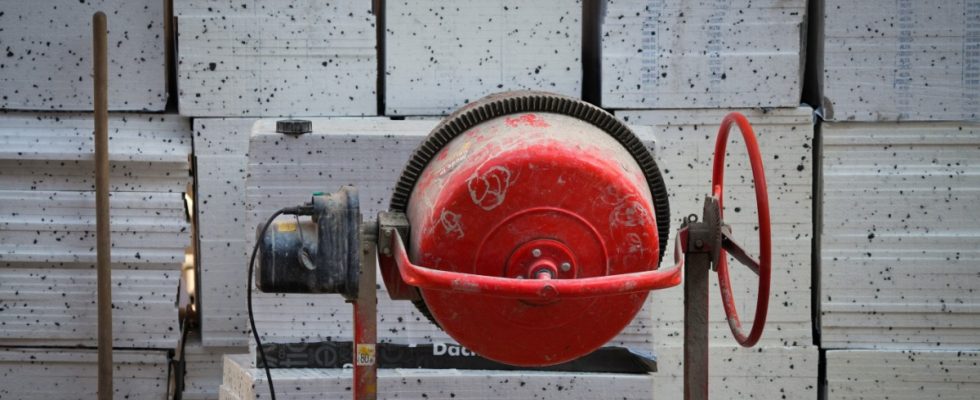It should probably be the good news for the day: At 11:42 a.m. sharp on Tuesday, the state-run KfW development bank sent out the news that it was once again accepting applications for climate-friendly new buildings, cooperative apartments and barrier-free renovations. That was happening in Berlin the latest report from the so-called “real estate experts” presented. The five-member committee, led by Freiburg economist Lars Feld, prepares a spring report on the situation on the housing market once a year on behalf of the real estate industry association ZIA.
Lars Feld, ZIA President Andreas Mattner and Federal Construction Minister Klara Geywitz (SPD) were sitting on the stage – but the KfW announcement did not improve the mood. Because the forecasts for the housing market remain bleak: According to the report, there will be a total shortage of around 720,000 apartments in Germany next year, and even 830,000 by 2027. The reason for this is relatively simple: too little is being built to accommodate the growing population population and the increasing need for living space in Germany.
There was an unbridled construction boom for 15 years, companies couldn’t keep up with orders, and prices for land, houses and apartments shot up ever faster. But the entire real estate sector is now in a deep crisis. Loan interest rates have risen dramatically since the beginning of 2022, and the federal government has also tightened the climate requirements for new construction funding – and real estate prices are falling. In addition, even in the best of times, too little was built: the traffic light coalition had actually planned to build 400,000 new apartments a year, 100,000 of which were social housing. This goal is becoming increasingly distant. The ZIA estimates that the number of new apartments completed annually could fall to 150,000 in the next one to two years. The Munich Ifo Institute also expects the number of new buildings to fall by a good third by 2026.
Investors would need 21 euros in rent per square meter, according to the report
From the point of view of association boss Mattner, the reasons for this are clear: too much bureaucracy, too high taxes, too little funding. The state takes too much and adds too little. “Anyone who builds goes bankrupt,” says Mattner. The report assumes a rent of 21 euros per square meter in the middle segment in order to build economically – too much for most households. The ZIA is therefore demanding nine billion euros a year from the federal government to support construction projects.
Opinions vary widely as to whether money alone solves the problem. The construction minister points out that a total of almost three billion euros will be available for 2024 alone, as well as in the coming years. The primary aim is to finance cheap loans – see KfW. Geywitz also wants to simplify building guidelines or, in cases of doubt, withdraw them. And she appeals to states and municipalities to speed up the approval process and reduce the property transfer tax.
Zwiti
Lars Feld can also get used to this. Otherwise, the economist, who is also one of the most important advisors to Finance Minister Christian Lindner (FDP), is curbing the euphoria about the funding pot. The state can only absorb market prices to a limited extent, said Feld. And he warns against fueling inflation with too much government spending. The industry can only manage a certain number of construction projects at the same time. When this limit is reached, additional subsidies only drive up prices, but not housing construction. When it came to building child benefit, companies simply increased their prices by the amount of the funding.
There is also another uncertainty factor: real estate prices. Houses and apartments in Germany have been trending cheaper for around a year and a half, and recently the price decline has even accelerated. This may be a hopeful prospect for private home buyers, but for professional real estate developers it could mean the end of many plans. Because there is uncertainty about what will happen next: Will the high demand stabilize prices, or will things continue to fall because there are fewer and fewer buyers on the market given the significantly higher interest rates? The Bundesbank says that the probability of further price declines is “lower than in previous years” – but that there is still “a certain risk of price corrections”. According to this, houses and apartments are on average ten to 15 percent more expensive than they should be given the economic demographic data. In the cities, residential properties are overvalued by 15 to 20 percent – despite the recent price declines.
However, the lobbyist, the economist and the minister agree on one point: the state quota, i.e. the proportion of construction costs caused by regulations, taxes and duties, must be reduced. According to the ZIA, this value is currently 37 percent. If the tax share falls noticeably, then average rents could also fall by several euros per square meter. However, states and municipalities – which are not represented on the podium on Tuesday – paid the bill.

